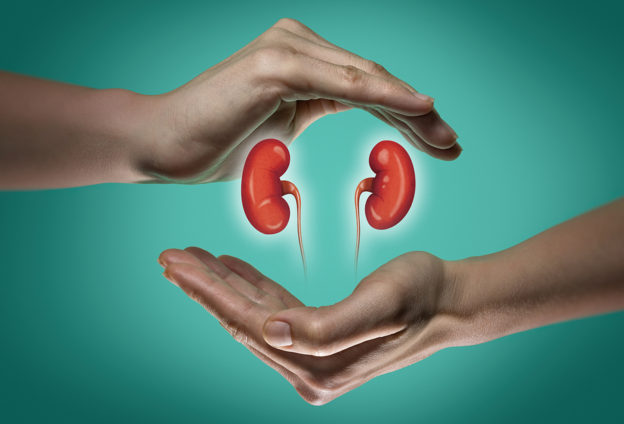By David Blyweiss, M.D., Advanced Natural Wellness
May 13, 2019
In the May 3rd issue of Advanced Natural Wellness I talked about COPD, the 3rd cause of disease related deaths here in the U.S.
Today I’d like to talk about another killer that ranks in the top 10 leading causes of death. And just like lung disease, it’s something people don’t think much about until they’re diagnosed with it.
I’m talking about chronic kidney disease (CKD).
Now, the problem with kidney disease is that you can’t see it. In fact, you may not even feel ill or notice any symptoms until it has reached advanced stages. But once you reach that point, there is no turning back.
That’s because there is no cure for CKD. The only way to survive kidney failure is with dialysis or a kidney transplant.
And here’s a real shocker.
Nine out of every 10 adults with CKD don’t even know they have it! Worse, some of these unsuspecting people have such low kidney function that they should be on dialysis… and they’re not.
Open your arteries, improve blood flow for a new health miracle...
Did you know your circulatory system has over 60,000 miles of arteries, veins and other blood vessels, if stretched end to end?
But as you age, your blood vessels undergo changes, which may cause them to stiffen, thicken and get clogged.
GOOD NEWS! Doctors have now identified a “Miracle Molecule” inside your arteries that helps OPEN your arteries and IMPROVE blood flow.
It’s what Dr. Valentin Fuster calls it, "One of the most important discoveries in the history of cardiovascular medicine."To you, that means...
- Healthy blood pressure
- Sharper mind and memory
- Skyrocketing energy and muscular strength
- Increased pleasure and passion in the bedroom
- Improved circulation to every cell and organ in your body
Go here to discover a new natural way to significantly boost the levels of this miracle molecule in YOUR body NOW!
Regrettably there are many common things we all do on a daily basis that can lead to kidney damage. And most folks don’t even think twice about them.
One of the worst examples is today’s over-reliance on proton pump inhibitors (PPIs) for gastric reflux. These seemingly innocuous medications aren’t nearly as safe as you would think, and they’re overprescribed at alarming rates.
Yet, it is well documented that people who use these drugs – even if they’re purchased over-the-counter – have a greater chance of developing chronic kidney disease and acute kidney damage that can lead to end-stage renal disease.
And here’s a sad note: More than half of people on PPIs who develop chronic kidney disease or end-stage renal disease have never had kidney problems before in their lives.
(If you take PPIs, you can learn how to wean yourself of these acid blockers here.)
I have the same criticism of NSAID pain relievers. It’s easy to reach for the ibuprofen, naproxen or other NSAID to take the edge off those aches and pains. Some folks take them every day.
But as safe as you may think these pain relievers are, they can damage your kidneys and cause liver failure. Even worse, they boost your chance of developing kidney cancer by about 50%.
Antibiotics, laxatives and diuretics can also harm your kidneys. But medications aren’t your only enemy.
The World's Quickest Solution for Ending Prostate and Urinary Misery
This has recently been revealed to be one of the only real breakthroughs in prostate health.
The seeds of a strange fruit (sometimes called "Chinese Apples") hold powerful phytonutrients that are a revolution in prostate health.
In fact, UCLA and Veterans Administration research have now proved this to be true.
Not only that, but it may be the worlds quickest solution for ending prostate misery.
Simply stated, these phytonutrients represent a huge step beyond beta sitosterol, saw palmetto, and other phytosterols alone.
Simply click HERE if you want to have fast prostate relief...restful, uninterrupted sleep...no more constant "urges to go"...enhanced virility...and optimal prostate support for life.
Sometimes the foods you eat can be just as damaging.
3 Common Food Items that can Damage Your Kidneys
Excess protein. While I find that many aging patients don’t get enough protein in their diets, the average American actually eats about two times more of it than they actually need.
This is a problem, since excess protein can raise uric acid levels and cause damage to your kidneys.
If you’re an active adult who wants to maintain your muscle strength, physical abilities and health, you should aim for about 0.5 grams of protein per pound of body weight.
And if you’re a real go-getter who is involved in extreme strength or endurance training, kick it up to about 0.8 grams per pound. Anything higher than that could be damaging to your kidneys.
High sodium intake. Getting too much sodium in your diet is another concern when it comes to kidney function. As a matter of fact, salt intake is viewed as a significant predictor in the development of new onset of kidney impairment. High intake increases the chances by nearly 30%.
To cut your salt intake, remember that the majority of salt in your diet – about 77% of it – doesn’t come from your salt shaker. It comes from processed, packaged and restaurant foods. So make sure to read labels and try to stay below 1,500 mg of sodium daily.
Too many soft drinks. One of the worst things you can do for your kidneys is to indulge in soft drinks – both diet and regular. Both are associated with kidney disease and end stage renal failure.
If you chug down a soda after a heated workout, it can do even more damage. Doing this for just seven days increases creatinine in the blood and lowers glomerular filtration rate. Both of these are markers for kidney injury
Drinking water during and after exercise does not have an effect on these markers.
The blood test your doctor orders looks for a waste product called creatinine and uses it in a formula to estimate your glomerular filtration rate. This tells how well your kidneys are working. The urine is tested for a protein called albumin, which can indicate that your kidneys aren’t working to filter your blood properly and may be damaged.
Testing for kidney disease isn’t difficult. All it takes are simple blood and urine tests.
SOURCES:
Xie Y, et al. Long Term Kidney Outcomes among Proton Pump Inhibitors Users without Intervening Acute Kidney Injury. Kidney Int. 2017 Jun;91(6):1482-1494.
Klatte DCF, et al. Association Between Proton Pump Inhibitor Use and Risk of Progression of Chronic Kidney Disease. Gastroenterology. 2017 Sep;153(3):702-710.
Xinyu Zhang, et al. Non-steroidal anti-inflammatory drug induced acute kidney injury in the community dwelling general population and people with chronic kidney disease: systematic review and meta-analysis. BMC Nephrol. 2017; 18: 256.
Cho E, et al. Prospective Evaluation of Analgesic Use and Risk of Renal Cell Cancer. Archives of Internal Medicine, 2011; 171 (16): 1487.
Suzuki K, et al. The association between serum uric acid and renal damage in a community-based population: the Takahata study. Clin Exp Nephrol. 2013 Aug;17(4):541-8.
Sugiura T, et al. Dietary Salt Intake is a Significant Determinant of Impaired Kidney Function in the General Population. Kidney Blood Press Res. 2018;43(4):1245-1254.
Rebholz CM, et al. Diet Soda Consumption and Risk of Incident End Stage Renal Disease. Clin J Am Soc Nephrol. 2017 Jan 6;12(1):79-86
Cheungpasitporn W, et al. Associations of sugar-sweetened and artificially sweetened soda with chronic kidney disease: a systematic review and meta-analysis. Nephrology (Carlton). 2014 Dec;19(12):791-7.
Chapman CL, et al. Soft drink consumption during and following exercise in the heat elevates biomarkers of acute kidney injury. Am J Physiol Regul Integr Comp Physiol. 2019 Mar 1;316(3):R189-R198.







